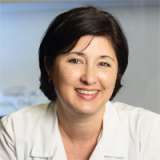Mayumi Prins, PhD

Mayumi Prins, PhD
Professor, Director BIRC Education Program
Hospital Affiliation
David Geffen School of Medicine at UCLA
Department of Neurosurgery
PO Box 956901
Los Angeles, CA 90095-6901
Contact: (310) 825-0646
[email protected]
Education
- Postdoctoral Degree, Anatomy and Cell Biology, Medical College of Virginia Richmond, VA 1998-2001
- Postdoctoral Degree, Neurosurgery, UCLA, Los Angeles, CA 1997-1998
- Ph.D., Neurobiology, UCLA, Los Angeles, CA 1992-1997
- B.S., Biology, UCLA, Los Angeles, CA 1991
Research Area
Dr. Prins’s research interests include understanding the changes in brain metabolism that occur after pediatric traumatic brain injury and how alternative fuels can be used as therapeutic options for the young brain after head injury. In addition to this main focus, she is interested in repeat mild head injuries as they apply to both children and young adult athletes.
Links
Awards/Inventions
- 2003 Young Investigator Award, UCLA Brain Injury Research Center
- 2005 Young Investigator Award, Brain Injury Association of America
Publications (recent articles)
- Wu, H., Kreissl, M.C., Schelber, H.R., Ladno, W., Prins, M., Shoghi-Jadid, K. , Chatziioannon, A., Phelps, M.E., Huang, S.C. First-pass angiography in mice using FDG-PET- A new method of deriving the cardiovascular transit time without the need of region-of-interest drawing. IEEE Transactions on Nuclear Science, 2005, 52(5)1311-1315.
- Prins, M.L., Fujima, L..S. , Hovda, D.A. Age-dependent reduction of cortical contusion volume by ketones following traumatic brain injury. Journal of Neuroscience Research 2005, 82(3)413-420.
- Kreissl, M.C., Wu, H.M., Stout, D.B., Ladno, W., Schindler, T.H., Zhang, X., Prior, J.O., Prins, M.L., Chatziioannou, A.F., Huang, S.C., Schelbert, H.R. Non-invasive measurement of cardiovascular function in mice with ultra-high temporal resolution small animal PET. Journal of Nuclear Medicine 2006, 47(6)974-980.
- Prins, M.L., Giza, C. Induction of Monocarboxylate transporter2 expression and ketone transport following TBI in juvenile and adult rats. Developmental Neuroscience 2006 28:447-456.
- Giza, C., Prins, M.L. Is Being Plastic Fantastic? Mechanisms of Altered Plasticity after Developmental TBI. Developmental Neuroscience, 2006 28:364-379.
- Wu. H.M., Sui, G., Lee, C.C., Prins, M.L., Ladno, W., Lin H.D., Yu A. SJ., Phelps, M.E., Huang, S.C. In vivo quantitation of glucose metabolism in mice using small animal PET imaging and a microfluidic device. J Nucl Med, 2007 48(5) 837-45.
- Prins, M.L. Cerebral Metabolic Adaptation and Ketone Metabolism After Brain Injury. Journal of Cerebral Blood Flow and Metabolism , 2008 (1) 1-16.
- Prins, M.L. Diet, Ketones and Neurotrauma. Epilepsia, 2008
- Appelberg, S.K., Hovda, D.A., Prins, M.L. The effects of ketones on behavioral outcome after controlled cortical impact injury in the juvenile and adult rat. Journal Neurotrauma (in press)
- Prins, M.L. and Hovda, D.A. The effects of age and ketogenic diet on local cerebral metabolic rates of glucose after controlled cortical impact injury. Journal Neurotrauma (in press)
Funded Grants
Current Research on Traumatic Brain Injury
Cerebral Substrate Support After Traumatic Brain Injury
Mayumi Prins, PhD
Professor and Basic Science Executive Council Member
Director, BIRC Education Program
The project entitled “Cerebral Substrate Support After Traumatic Brain Injury” was funded by the National Institute of Neurological Disorders and Stroke at NIH to investigate the therapeutic potentials of alternative substrates after Traumatic Brain Injury in improving brain metabolism and behavioral recovery. Despite decades of intensive research there is still no effective treatment to promote functional recovery after traumatic brain injury (TBI) and at least 5.3 million Americans currently live with TBI associated disabilities. These chronic disabling impairments that impact independent living are associated with annual economic costs of at least $56 billion. There is an urgent need for novel research and different approaches to evaluate potential therapies for their impact on recovery after TBI. The aims of this project will provide the following information contributing to its impact on the TBI population. The experiments proposed in this grant will be the first to directly compare the effectiveness of alternative brain fuels in improving brain energy metabolism and functional recovery after TBI. Collectively this work challenges the current standard of care (maintaining plasma glucose levels) for all TBI patients and helps determine the optimal brain fuel with the goal of improving the lives of TBI patients and their families.
Timing of Exercise in Concussed Rathletes
The project entitled “Timing of Exercise in Concussed Rathletes” was funded by the Brain Injury and Neurovascular Pathologies section at NIH to address the effects of exercise on repeat concussions and determines when it is safe to resume activity in male and females. Traumatic brain injury (TBI) affects an estimated 3.8 million people per year with adolescent and young adults representing the population with highest injury incidence. The majority of the injuries are mild TBI (mTBI) or concussions. According to the CDC, sports related activities make up over 50% of concussion and mTBI with approximately 1/3 experiencing repeat concussions. Repeat mTBI (rTBI) is a growing concern for adolescents and young adults and occurs during a time of ongoing cerebral development. The current guidelines for athletes with concussions is to rest until symptom free and then start the return to play protocol. Mental and physical rest have been encouraged to reduce cerebral energy demands, prevent risk of additional injuries, and to avoid the presumably detrimental effects and symptom exacerbation associated with early exercise. However, the question of exercise after concussion has been revived by an increasing number of reports emphasizing the benefits of activity. What remains unclear is when can athletes with concussions resume exercise without exacerbating damage, impairing cognition or interfering with plasticity. The central objective of this grant is to determine the optimal time to rest before starting exercise as it relates to sex and activity level prior to injury. Collectively, findings from these studies will show that the brains of athletes are fundamentally different than those of sedentary individuals and these differences contribute to different responses and recovery from rTBI. These studies will not only provide important effects of exercise on the brain in regards to adolescent brain health, but will also provide guidance for return to activity and play guidelines for all concussed adolescents and young adults.